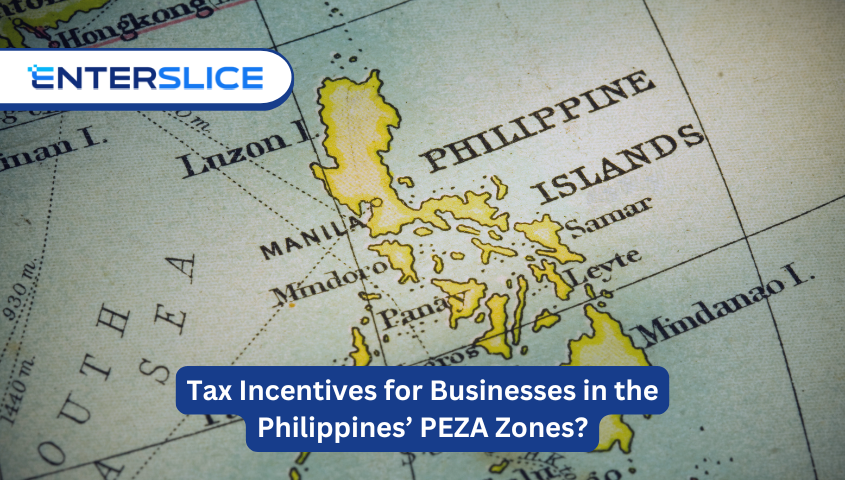The Philippines has emerged as a top destination for entrepreneurs looking to expand their business globally. Known for its strategic location, vibrant economy, and business-friendly policies, the country offers an attractive environment for foreign companies to set up a company in the Philippines. One of the most appealing features of doing business in the country is the opportunity to tap into the tax incentives offered by the Philippine Economic Zone Authority (PEZA). These incentives can significantly reduce your tax burden, making the Philippines a lucrative option for global entrepreneurs.
In this blog post, we’ll explore the tax incentives available for businesses in the Philippines’ PEZA zones and how you can benefit from them when you register a corporation in the Philippines.
What Is PEZA?
The Philippine Economic Zone Authority (PEZA) is a government agency that manages and promotes economic zones throughout the country. These zones are designated areas that offer businesses a host of financial incentives to attract investment. Foreign and local companies alike can benefit from these zones, which are designed to support industries like manufacturing, export services, IT, and tourism.
If you’re considering company registration in the Philippines, especially if you’re planning to engage in export or technology-based businesses, you may want to look into PEZA zones for their compelling tax benefits. Let’s dive into the key tax incentives available within these zones.
Key Tax Incentives for Businesses in PEZA Zones
1. Income Tax Holiday (ITH)
The Income Tax Holiday (ITH) is one of the most significant tax incentives offered to businesses in PEZA zones. This incentive allows qualified companies to enjoy a period of exemption from paying corporate income tax. Typically, the duration of the ITH is between 4 and 6 years, depending on the nature of the business, with the possibility of extending the exemption for up to 10 years if certain conditions are met.
- For Export-Oriented Companies: If your business focuses on exports, the ITH can be extended for a longer period.
- For Non-Export-Oriented Companies: The tax holiday typically lasts for 4 years, after which the company will be subject to a reduced tax rate.
This tax holiday offers foreign companies a huge opportunity to maximize their profits during the initial stages of their operations, making setting up a company in the Philippines particularly attractive for new ventures.
2. Reduced Corporate Income Tax Rates
After the expiration of the Income Tax Holiday, businesses in PEZA zones are still entitled to a reduced corporate income tax rate. Instead of the standard 30% corporate income tax rate, PEZA-registered businesses pay a lower tax rate of only 5% of gross income. This is a substantial reduction that can help your business save significantly on taxes as it becomes more established in the Philippines.
This incentive is particularly appealing for businesses that register a corporation in the Philippines and want to maintain long-term profitability. The 5% tax rate is one of the most attractive in the region, making PEZA zones a highly competitive option for companies seeking to lower their tax liabilities.
3. VAT-Exemption on Importation of Capital Equipment
For businesses involved in manufacturing, IT, or other capital-intensive industries, PEZA zones offer a major benefit: VAT exemption on the importation of capital equipment. This means that businesses in these zones do not have to pay the Value Added Tax (VAT) on their imported machinery, equipment, and materials, provided that they are used directly in their operations.
This exemption can result in substantial cost savings for foreign businesses looking to invest in high-value equipment. By registering a corporation in the Philippines and establishing operations within a PEZA zone, you can take advantage of this tax benefit, allowing you to reinvest those savings into other areas of your business, such as R&D or expansion.
4. Exemption from Local Business Taxes and Fees
Another benefit for companies in PEZA zones is the exemption from local business taxes and fees, including the local business tax (LBT), which is typically levied by local government units (LGUs). This exemption applies to all registered businesses within PEZA zones, allowing you to focus your resources on growing your business instead of dealing with additional tax burdens.
In addition to this, companies in PEZA zones are exempt from paying other local taxes, such as real property tax, ensuring that you can focus more on your operations and less on local tax compliance.
5. Customs Duty Exemption for Exporters
For companies that engage in export activities, PEZA provides another major benefit: exemption from customs duties on the importation of raw materials, capital equipment, and machinery used in manufacturing products intended for export. This exemption helps reduce your production costs, making it easier for your business to remain competitive in global markets.
This is especially advantageous if you’re planning to engage in large-scale manufacturing or export-based services. Foreign company registration in the Philippines can open up opportunities for your business to leverage these exemptions and access global markets with reduced overhead costs.
6. Special Economic Zone Incentives for Tourism Projects
If you’re involved in tourism-related businesses, such as resorts, hotels, or entertainment centers, PEZA also provides tailored incentives for tourism projects. These include exemptions from local taxes, import duties, and VAT on certain tourism-related activities and investments. The Philippines is one of the most popular tourist destinations in Asia, and PEZA zones cater to this growing sector with a host of attractive incentives.
How to Take Advantage of PEZA Tax Incentives
To take advantage of these tax incentives, it’s crucial that you follow the right procedures when setting up a company in the Philippines. Here are the key steps:
- Register with PEZA: As part of the foreign company registration in the Philippines, you’ll need to apply for registration with PEZA to enjoy the incentives offered. This process requires submitting an application, paying fees, and demonstrating that your business aligns with PEZA’s criteria.
- Comply with PEZA Regulations: Once you’re registered, it’s essential to comply with all PEZA guidelines, including reporting your income and fulfilling other business obligations, to continue enjoying the tax benefits.
- Maintain a PEZA-Approved Business Activity: Not all business activities qualify for PEZA incentives. Make sure that your business fits the criteria for PEZA registration, which primarily targets export and high-tech industries.
Conclusion
The Philippines offers a highly competitive tax environment for businesses operating within PEZA zones, thanks to its Income Tax Holiday, reduced corporate income tax rates, VAT exemptions, and other attractive benefits. If you’re looking to expand your business internationally, register a corporation in the Philippines and set up a company in the Philippines within one of these zones could provide your company with the edge it needs to succeed.
By taking advantage of PEZA’s tax incentives, you can enjoy significant cost savings that will help you grow and thrive in the Philippine market. If you’re considering foreign company registration in the Philippines, now is the ideal time to explore the opportunities that PEZA zones provide.
Also Read: Checklist for Company Limited by Guarantee Formation in Singapore
FAQs:
- What is the PEZA Income Tax Holiday, and how long can it last?
- The Income Tax Holiday (ITH) offers businesses a tax exemption for a period of 4 to 6 years, with the possibility of extending it for up to 10 years, depending on the type of business.
- Can I benefit from PEZA tax incentives if I don’t plan to export?
- Yes, you can still benefit from reduced tax rates and other incentives, though the ITH may be shorter for non-export-oriented businesses.
- How do I register my business in a PEZA zone?
- To register a business in a PEZA zone, you need to submit an application to PEZA, along with required documents that outline your business activities and compliance with PEZA criteria.
Also Read
- ► Why Cloud Computing and Full Stack Development Go Hand-in-Hand
- ► Cheap Flyer Printing: A Cost-Effective Solution for Your Marketing Needs
- ► How to Become a Digital Marketer: Best Courses for Beginners
- ► Revenge Hoodies modern perfect shop
- ► 7 Required Unique Skills of an SEO Executive in 2025!
- ► 5 Key Advantages of Taking Mock Tests Through Online NEET Coaching!
- ► How Many People Are Added On Facebook In A Day?
- ► Top 5 of the Best Marketing Techniques for 2025!
- ► IWFM Assignment Help: Unlocking Academic Success
- ► How Do You Configure A New Company Code In SAP?
- ► Why Is Sleep Important for Your Mental and Physical Health?
- ► Instagram followers – why having a large number of followers on your profile is important
- ► 10 Best Practices for Staying Upbeat While Preparing for the JEE Exam!
- ► 5 Ways to Lose Weight by Eating More in the Morning!
- ► How To Get Rid Of Teeth Stains?





